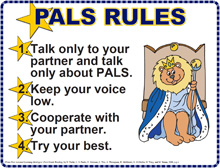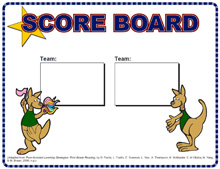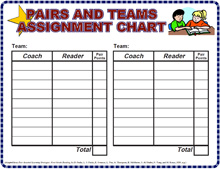How can the teachers at Washington Elementary implement these activities?
Page 6: Prepare Materials
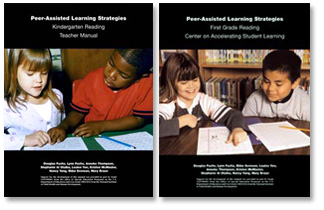 Before they train their students to use PALS, the teachers at Washington Elementary want to be certain that all their materials and resources are in place. They are excited to learn that practically all of the materials they need to implement PALS in kindergarten and first-grade classrooms are contained in their respective manuals.
Before they train their students to use PALS, the teachers at Washington Elementary want to be certain that all their materials and resources are in place. They are excited to learn that practically all of the materials they need to implement PALS in kindergarten and first-grade classrooms are contained in their respective manuals.
Note: These manuals can be ordered through the PALS website: https://frg.vkcsites.org/what-is-pals/. A nominal fee covers printing and shipping.
Kindergarten Materials
During her evaluation of the K-PALS manual, Mrs. Doris, a kindergarten teacher, finds that there are 72 Sound Play (i.e., phonological awareness) and 72 corresponding Sounds and Words (i.e., decoding lessons). In addition, there are four introductory lessons, scripts for the lessons, a K-PALS rules poster, a student assignment chart, and a point sheet. Aside from the materials in the manual, Mrs. Doris needs to make certain that she has:
 A timer to monitor the time for each activity
A timer to monitor the time for each activity- Folders to hold each pair’s K-PALS lessons and point sheets
- Books (later in the year)
First-Grade Materials
Ms. Chandler, a first-grade teacher, discovers that the first-grade PALS manual includes 68 teacher-directed lessons and 70 Sounds and Words student lessons. Much like the kindergarten teacher, Ms. Chandler notices that the manual includes a Speed Game Star Chart, and a point sheet. In addition to these materials, Ms. Chandler will need:
 A timer to monitor the time for each activity
A timer to monitor the time for each activity- A calculator to tally team points
- Folders for each pair’s PALS lessons and point sheets
- Books of various reading levels for Partner Reading (later in the year)
- A Speed Game incentives bag
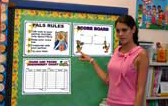 Because most of her first-grade students have already or will soon develop basic reading skills, Ms. Chandler also displays three items—recommended by the manual—on her PALS bulletin board. Teachers can opt to use the versions provided in the PALS manual, to create their own personalized versions, or to use those created by Ms. Chandler. Click on each of the items below for a printable copy.
Because most of her first-grade students have already or will soon develop basic reading skills, Ms. Chandler also displays three items—recommended by the manual—on her PALS bulletin board. Teachers can opt to use the versions provided in the PALS manual, to create their own personalized versions, or to use those created by Ms. Chandler. Click on each of the items below for a printable copy.
As she prepares materials for her students, Ms. Chandler ponders the type of books she will choose for the pairs. She now knows that:
 Books should reflect the reading level of the lower-performing reader (i.e., the weaker reader should be able to read the text with no more than 10 errors for every 100 words).
Books should reflect the reading level of the lower-performing reader (i.e., the weaker reader should be able to read the text with no more than 10 errors for every 100 words).- Repeated reading of a book is beneficial because it leads to greater reading fluency and comprehension. However, because it is important to expose the students to a variety of books, books should be redistributed among pairs at a minimum of once per week.
- Books should be relatively short so that students have an opportunity to read through a book at least twice during the Partner Reading activity.
